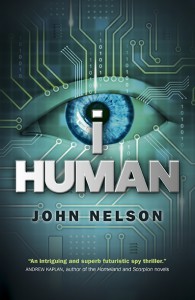
 I,
Human is a fascinating and rich speculative fiction book by John Nelson, exploring the future of genetic implants. Here is a Q&A with John, where he goes deep into the subject:
I,
Human is a fascinating and rich speculative fiction book by John Nelson, exploring the future of genetic implants. Here is a Q&A with John, where he goes deep into the subject:
Q: So I take it that this is a sci-fi novel?
A: Well, I think many would classify it as speculative fiction as well, like Brave New World and 1984.
Q: What’s the difference?
A: I like Margaret Atwood’s definition of speculative fiction as a “no Martians” type of science fiction, “about things that really could happen.”
Q: So you speculate that in the near or far future everybody will have neural implants in their heads.
A: Given the speed of our technological advances, I think that’s a reasonable assumption.
Q: But, I take it, that will have unforeseen consequences, or at least that’s your premise.
A: Well, after a hundred years of modern psychology, we’ve come to realize that an over emphasis of the thinking function will repress feelings with dire consequences.
Q: And that’s what these neural processors in your future world do?
A: They bestow an average intelligence quotient of 200 plus, but they largely suppress feeling and intuition, and make people much more logic- or mental-based, but emotionally fragile.
Q: But wouldn’t a whole population of super smart people be able to solve a lot of our pressing problems?
A: Yes, one would think so, but it will also create, or does create in our world, more emotional dysfunction, and more problems—ones that can’t be “figured out.”
Q: Which, I take it, tips the scale and threatens the social order in this future world.
A: Yes, and the problem for the techno elites of this age is that after 50 years of neural implants, they’ve lost the ability to program integrative functioning.
Q: But the Bornies in your scenario, or those who don’t have implants, are more balanced and may hold the key that could save them?
A: Well, there is a borny healer who is able to modify neural implants to integrate more feeling content, and so the government has my Alan Reynard, who is an intelligence analyst, to infiltrate her community fitted with an experimental neural processor with self-learning functions.
Q: Hoping that a healing by her will reprogram his processor which they can then roll out to the masses?
A: Well, it’s not as simple as that, because while they want to prevent wholesale emotional breakdowns, the techno elites want to also maintain their control and fully integrated human beings could be even more of a problem for them.
Q: Which is much more in line with a Brave New World scenario?
A: Well, the problem they face is that advances in technology could allow aberrant individuals to pose a serious threat, with suitcase atomic bombs and self-replicating nanobots, or whatnot, so at least in their mind, a total surveillance society and a partially subdued population is justified.
Q: Sounds like _1984_’s Big Brother to me.
A: Well, it’s not nearly as bleak as either of those books. In fact, it’s very much like our society with these kinds of tendencies in our world full-blown in theirs but not yet insurmountable.
Q: So you see this as where we’re headed, with these neural processors an extension of Bluetooth devices and iPhones.
A: Yes, and I’m not saying that all of the aims of transhumanism, or the general concept of enhancement of our human limitations, are detrimental but a balanced perspective is needed.
Q: In what regard?
A: We are feeling and intuitive creatures as well as thinkers, and that as Carl Jung would point out, we need a balance between our thinking and feeling functions for psychological wellbeing. I might add that the suppression of feelings is how totalitarian regimes manipulate people, or do so in the aforementioned novels.
Q: But, I take it, that the government gets more than their bargain for?
A: Yes. Alan’s healing opens him to even deeper levels of himself, and he aligns himself with the healer, and they use bio-energetics to reprogram his processor for much more integration of feelings and intuition.
Q: And then they bring him back to the Bradbury Institute, the company that created the neural implants and his experimental processor, and remove it for analysis.
A: And that’s where the story gets a little dicey with them grilling him about all of the new neural pathways in his processor, with Alan eventually convincing them—after the main villain, Dr. Klaus, subjects him to chemical interrogation—to roll out their upgrade to the general population.
Q: Do we see the effect, or is this a lead-up for a book two?
A: No, it ends with the announcement of the X5 upgrade, but artistically that made more sense, and we’ll leave it at that.
Q: I find it curious that the cover has a spy novelist’s endorsement: “a futuristic spy thriller.”
A: As I said this is speculative fiction, which has also been defined as fiction in which the laws of the world are different from ours, to paraphrase the novelist Annie Neugebauer.
Q: So it crosses different genres?
A: Well, a Goodreads classifies such titles as the Hunger Games, Snow Crash, Cat’s Cradle, and the Time Traveler’s Wife as speculative fiction. And I might add that a Barnes and Noble blog includes The Martian in this category, which is also written in the first person by a witty commentator.
Q: And now a speculative futuristic spy thriller.
A: Yes, I’ve always been one to blur the boundaries or cross over them, as it were.
Author Bio
John Nelson is a former editorial director, and now owner of Bookworks Ltd. He is the author of Starborn, Transformations, Matrix of the Gods and the award winning The Magic Mirror.
Online: Facebook, Author Website, Twitter
Previous Titles
The Magic Mirror (9781571745507) Red Wheel/Weiser, 2007. Starborn (0915442684), Donning Co., 11/78–1993, 10,144 copies. Transformations (0898655498) Donning Co., 11/88–3/90, 1673 copies (over two editions). Matrix of the Gods (1878901974), Hampton Roads Pub, 9/94–6/2013, 2252 copies.
Categories:
0 comments on this article







